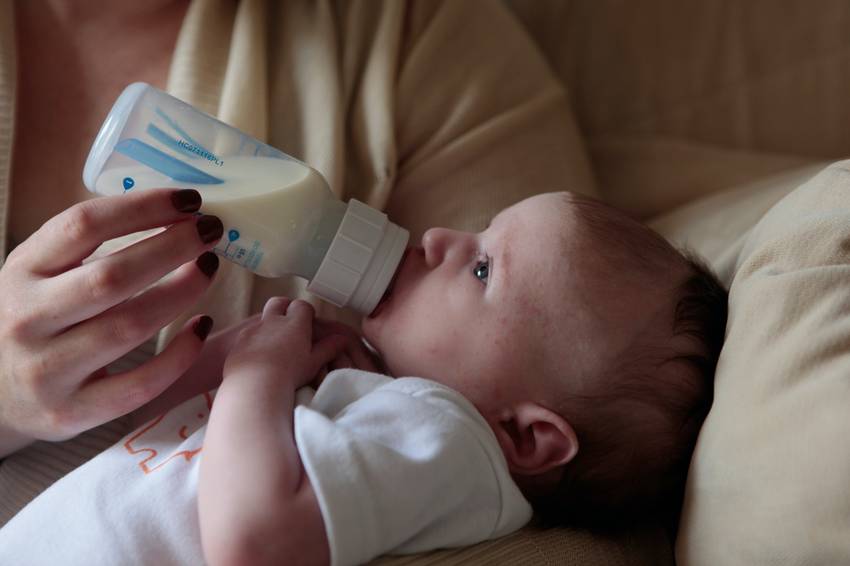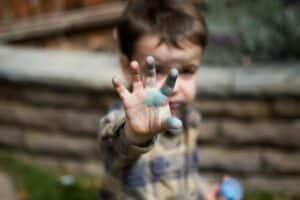If you’ve ever smelled a baby’s bad breath, then you know it doesn’t have a pleasant smell. While this may not be the most appealing scent in the world, there is a good reason why a baby’s breath smells this way.
How to get rid of baby’s breath smells like sour milk?
Maintaining general hygiene like washing hands, toys and pacifiers frequently are crucial. Another best solution could be to gently wipe your baby’s gums and teeth with either a soft-bristled toothbrush or a soft damp cloth, especially after their meals and before bed. Additionally, food low in sugar & starch is recommended.
In this blog post, we will discuss why your baby’s breath might smell and provide some tips on how to reduce or eliminate this scent.

What Causes Sour-Smelling Breath In Babies?
Oral Hygiene
Bacteria are packed in our mouths. If your child has teeth, the germs might be between their sweet teeth. Please make certain you’re brushing their teeth correctly. Toddlers may help brush their teeth; however, they aren’t old enough to brush them independently. To ensure that you’re brushing your baby’s teeth properly, use a finger brush and fluoride toothpaste.
Sinusitis
When someone has sinusitis, it means that their sinuses are swollen. This can happen to infants too, and not just adults.
- Fever.
- Sour or vinegar smell.
- Pain.
- Congestion.
- Postnasal drip.
- Headache.
There are a few ways to help clear an infant’s congestion, like using saline drops or a nasal syringe. If the cause is a bacterial sinus infection, antibiotics prescribed by a pediatrician will kill the bacteria and clear up the infection.
Acid Reflux
This can cause stomach discomfort, heartburn, and foul breath in infants.
- Vomiting.
- Sour breath.
- Coughing.
- Gas.
- Fussiness.
- Heartburn.
- Dry mouth.
- Wheezing.
- Choking or gagging when feeding.
- Refusing to eat.
- Crying following eating.

What Should You Do If Your Baby’s Breath Smells Like Sour Milk?
Although it’s easy to pretend that the baby smell doesn’t exist, you shouldn’t. One common reason for your child’s bad breath is the bacteria in your baby’s mouth’s reaction to food particles that have been there for a while, near the tonsils.
If your baby has recently eaten something stinky, their mouth may also have a foul odor. GERD (gastroesophageal reflux) could be the source of that sour milk unpleasant breath. When your infant’s fairly new digestive systems attempt to process what they’ve consumed, GERD or acid reflux can make them irritable, and crying during feeding is common.
If you have a baby already old enough to have teeth, their breath can be unpleasant due to cavities, abscesses, or tartar build-up. Improper oral hygiene and foreign items trapped in the infant’s mouth might also produce a foul odor.
Furthermore, chronic sinusitis can cause bad breath. And if it occurs with other symptoms like a cough, runny nose, or nasal obstruction, it can be even worse.
Ensure your baby drinks enough water and has good dental hygiene to relieve this. You may also try blowing your child’s nose to unblock it.

What To Do When A Baby’s Breath Smells Like Sour Milk?
Although it may not smell great, you can do a few things to ease the situation if your baby’s mouth smells like sour milk. These include:
- Gently wipe your baby’s mouth with a soft, warm cloth after each feeding, making sure to cover their tongue and gum area entirely.
- If your baby is old enough to eat solids, try not to give them foods with an overpowering smell. You should also ensure that they rinse their mouth with warm water as soon after eating as possible. Note: always consult a health professional before giving your baby solid foods.
- Keep a small amount of baby toothpaste and a soft-bristle toothbrush close by if you can brush your toddler’s teeth. It’s best to have them clean their teeth after they eat anything.
- Ensure your baby keeps their attention on you at all times, so they don’t swallow anything foreign.
- The most effective thing you can do for your infant if GERD is to ensure they are not resting on their back right after eating.
- If none of these techniques works, and your baby’s bad breath persists, it’s time to see a doctor. The doctor can determine whether a serious underlying problem is causing this issue and recommend a medical cure.
Naturally, babies are supposed to be flawless and have a pleasant fragrance. When this does not happen, you may be frantically wondering what to do if your baby’s breath smells like sour milk.
It’s not usually a cause for concern, but it is critical to understand what causes it and how to permanently cure your baby’s bad breath.
Frequently Asked Questions
Q1: Why does my baby’s breath smell like poop?
Ans: In most situations, underlying medical problems such as GERD, diabetes, or sinusitis inflammation might be to blame. Poor dental hygiene may also be a cause. It’s possible to cure and alleviate the above issues with treatment, but it’s preferable to see a doctor.
Q2: When should my toddler use toothpaste?
Ans: At least by the age of 18 months. It’s also preferable to start with tiny quantities of low-fluoride toothpaste. Unless your child can spit, avoid using adult toothpaste. Pediatricians recommend changing toothpaste at six years old, although there is no hard and fast rule regarding when toddlers should switch to fluoride toothpaste.
Q3: Do babies’ breath smells sour when they’re teething?
Ans: Several things might indicate your baby is teething. For example, you might notice a change in their smell – like if they start to have vinegary breath due to increased drooling or changes in their poop. However, it’s always best to check for other potential issues, too, so that you can be sure what the root cause of the problem is.
Q4: Why does the baby’s breath smell like vinegar?
Ans: It’s usually nothing to worry about and is often caused by teething or GERD. However, if the problem persists, it’s best to see a doctor as it might indicate a more serious underlying issue.
Q5: Can baby breath smell like cheese?
Ans: Yes, sometimes it’s caused by teething or GERD. However, if the problem persists, it’s best to see a doctor as it might indicate a more serious underlying issue.
Conclusion
If your baby’s breath smells sour, there is usually no need to panic. However, if the problem persists, it’s best to see a doctor as it might indicate a more serious underlying issue. In rare cases, bad breath might be a sign of something more serious, so it’s always best to be on the side of caution and seek medical attention if you’re unsure.







